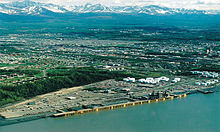Knik Arm




Knik Arm (Dena'ina: Nuti) is a waterway into the northwestern part of the Gulf of Alaska. It is one of two narrow branches of Cook Inlet, the other being Turnagain Arm. Knik Glacier empties into the Knik Arm. The Port of Anchorage is located on the arm.
Etymology
[edit]The Dena'ina name for Knik Arm is Nuti, meaning "salt water".[1] The name "Knik" comes from igniq, the Iñupiaq word for "fire". It has been written Kinik, Kneep, Kneik, Kook, Knuyk, and Kweek.[2]
Geography
[edit]Knik Arm begins at the Inlet's northern edge, near Anchorage, before heading north and east. It is about 15 miles (24 km) long, and at its upper end, receives the waters of the Matanuska River. West of Knik Arm is the delta of the Susitna River, the largest stream emptying into the inlet.[3] At the head of Knik Arm, at the mouth of Knik River, was the village (ghost town) of Knik.[4] Knik Arm's other major tributaries are Ship Creek, Eagle River, Peter's Creek, Eklutna River and Fish Creek. The greater part of the plain, lying between the Knik Arm and the Susitna River, is drained by the Little Susitna. The upper part of Knik Arm merges into the delta of the Knik and Matanuska rivers, which unite just above tide limits.[5]
History
[edit]Knakatnuk and Nitak (or Nitakh) were historic native villages on the arm's shore.[2] The 1964 Alaska earthquake destroyed or significantly damaged most of the Anchorage neighborhoods adjacent to the Arm, including the downtown area. The proposed Knik Arm Bridge would measure approximately 2 miles (3.2 km) from Point MacKenzie on the west in the Matanuska-Susitna Borough to Anchorage on the east.[6] The Knik Arm ferry was a proposed year-round passenger and auto ferry across the arm which was to use the M/V Susitna SWATH / barge convertible expedition craft.[7]
References
[edit] This article incorporates text from this source, which is in the public domain: U. S. Congress's "Congressional edition" (1901)
This article incorporates text from this source, which is in the public domain: U. S. Congress's "Congressional edition" (1901) This article incorporates text from this source, which is in the public domain: Fish and Wildlife Service's "North American Fauna" (1897)
This article incorporates text from this source, which is in the public domain: Fish and Wildlife Service's "North American Fauna" (1897) This article incorporates text from this source, which is in the public domain: Alaska (Ter.) Governor's "Annual Report ... to the Secretary of the Interior" (1898)
This article incorporates text from this source, which is in the public domain: Alaska (Ter.) Governor's "Annual Report ... to the Secretary of the Interior" (1898) This article incorporates text from this source, which is in the public domain: U.S. Geological Survey's "Annual Report of the United States Geological Survey to the Secretary of the Interior" (1900)
This article incorporates text from this source, which is in the public domain: U.S. Geological Survey's "Annual Report of the United States Geological Survey to the Secretary of the Interior" (1900)
- ^ "Nuti, Knik Arm".
- ^ a b United States. Congress (1901). Congressional edition. Vol. 4366 (Public domain ed.). Government Printing Office. pp. 245, 300–.
- ^ North American Fauna (Public domain ed.). Fish and Wildlife Service. 1897. pp. 243–.
- ^ Alaska (Ter.) Governor (1898). Annual Report ... to the Secretary of the Interior (Public domain ed.). U.S. Government Printing Office. pp. 60–.
- ^ "Knik Aem Area". Google Maps. Retrieved January 10, 2018.
- ^ "Frequently Asked Questions". Knik Bridge. Archived from the original on October 17, 2014. Retrieved April 24, 2014.
- ^ "13-090S, Sale of the M/V Susitna". Matanuska-Susitna Borough. Retrieved March 28, 2013.
External links
[edit] Media related to Knik Arm at Wikimedia Commons
Media related to Knik Arm at Wikimedia Commons
